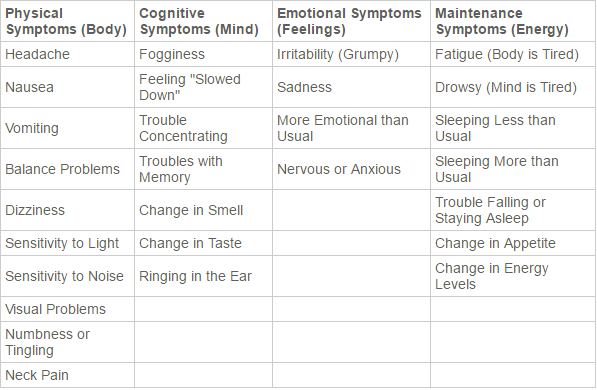After a significant bump on the head, you might wonder: Do I have a concussion? A concussion is a brain injury a fall, bike or car accident, or even a fist fight. Sports activities, including football, hockey and soccer, can also lead to concussions if a blow to the head occurs. A concussion usually leaves no visible sign of injury; however, it is still a serious condition that requires immediate treatment. It is very important to see a medical professional in the aftermath of a hard blow to the head, even if you feel fine initially.

Do You Have a Concussion?
Contrary to popular belief, you do not have to lose consciousness to have a concussion. The damage to the head is often very subtle at first and takes some time to show more overt symptoms.
Concussions often cause headache and dizziness which usually go away within several days. But about five percent of people who have a concussion will have a blood clot of bleeding on the brain, which is a very serious and even life-threatening.
When you suspect "Do I have a concussion", check your symptoms from the four main categories:

When to See a Doctor
“Do I have a concussion?” If you have to ask this, it’s time to call your doctor. The following symptoms mean you should seek emergency treatment right away:
- Loss of consciousness, even for only a moment
- Amnesia or no memory of the event
- Seizures
- Pupils of unequal size
- Abnormal eye movements
- Blood or clear fluid coming from the nose or ears
- Confusion
- Vomiting
- Slurred speech
- Muscle weakness
- Problems with walking or unsteady gait
- For a child under the age of two, scalp swelling and any changes in the way they usually behave warrants emergency treatment.
Remember that concussions might also come with injuries to the spine. Avoid moving the neck and back when someone has a concussion and call an ambulance instead.
Tests to Tell If You Have a Concussion
The doctor will first evaluate your signs and symptoms and review your medical history.If a concussion is expected, you will undergo a series of tests to determine what’s wrong.
1. Neurological Test
This evaluation includes a thorough check of your hearing, vision, balance, coordination, reflexes, strength and sensation.
2. Cognitive Test
These tests will focus on how well your brain is working, including memory tests, concentration, and the ability to recall information that was given to you at an earlier time.
3. Imaging Test
A CT scan of the brain can be helpful in providing the images of your brain and skull after a serious injury. An MRI can diagnose bleeding and other issues.
4. Observation
In most cases, the doctor will keep you overnight in the hospital for observation. If you want to be observed at home you will need someone to watch you for at least the first 24 hours after the injury occurred.
How to Treat a Concussion
When the answer to "Do I have a concussion?" is positive, it is time to seek medical treatment. Treatment for a concussion is based on your particular symptoms. Most concussions do not require invasive treatment; instead, you will be closely observed and awakened every two or three hours to ensure that you do not go into a coma. Your behavior will be carefully monitored for any abnormal signs.
Headaches can be treated with acetaminophen. Avoid ibuprofen (Advil, Motrin IB, others) and aspirin because they can increase the risk of bleeding. You will be asked to rest and avoid any activities that might lead to another blow on the head (such as playing sports). Depending upon the severity, you might even be asked to avoid driving or riding a bike. Alcohol should also be inhibited.
How Can You Prevent a Concussion?
Prevention Guidelines for Adults
- Always wear a seatbelt.
- Always wear a helmet when playing sports such as football, hockey or baseball; use a helmet when riding a bike or ATV, when skiing or snowboarding, or when riding a horse.
- Make your home a safer place by removing items that might cause falls, such as loose carpeting.
- Never, ever drive while under the influence of alcohol or drugs.
Prevention Guidelines for Children
- Always use child car seats and booster seats.
- Teach your child playground safety, as well as safety around vehicles.
- Invest in well-fitting helmets tailored to those activities.
- Take steps to keep your child safe from falls in the home.
